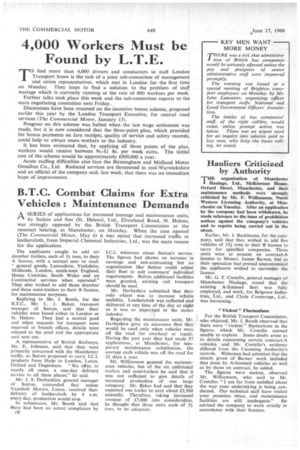B.T.C. Combat Claims for Extra Vehicles : Maintenance Demands
Page 44

If you've noticed an error in this article please click here to report it so we can fix it.
ASERIES of applications for increased tonnage and maintenance units, by Sutton and Son (St. Helens), Ltd., Eltonhead Road, St. Helens, was strongly opposed by the British Transport Commission at the resumed hearing, at Manchester, on Monday. When the case opened (The Commercial Motor, May 6) it was stated that increased traffic in leathercloth, from Imperial Chemical Industries, Ltd., was the main reason for the application.
The applicants sought to add six drawbar trailers, each of 31 tons, to their A licence, with a normal user to read: " general goods, Lancashire, Yorkshire, Midlands, London, south-west England, Home Counties, South Wales and on Continental services when operated." They also wished to add three drawbar and three semi-trailers to their B licence, for maintenance purposes.
Replying to Mr. J. Booth, for the B.T.C., Mr. L. J. Baker, transport manager of Sutton, said that their vehicles were based either in London or St. Helens. They had a central pool and when requests for transport were received at branch offices, details were relayed to the pool and the appropriate unit sent out.
A representative of British Railways, Mr. E. Johnson, said that they were primarily concerned with the Manchester traffic, as Sutton proposed to carry I.C.I. products from Hyde to London, Luton, Oxford and Dagenham. "We offer, in neatly all cases, a one-day delivery service to all these places," he said.
Mr. J. S. Derbyshire, general manager of Sutton, contended that unless Vauxhall Motors, Luton, received their delivery of leathercloth by 4 a.m. every day, production would stop.
In submission, Mr. Booth said that there had been no actual complaints by c8 I.C.I. witnesses about Sutton's service. The figures had shown an increase in earnings and sub-contracting but an organization like Sutton could. adjust their fleet to suit customers' individual requirements. Before additional facilities were granted, existing rail transport should be used.
Mr. Derbyshire submitted that their only object was to increase vehicle mobility. Le-athercloth was collected and delivered at any time of the day or night as it was so important to the motor industry.
Regarding the maintenance units, Mr. Derbyshire gave an assurance that they would be used only when vehicles were off the road for overhaul or repair. During the past year they had made 57 applications, at Manchester, for temporary maintenance substitution. On average each vehicle was off the road for 32 days a year.
Mr. Williamson granted the maintenance vehicles, but of the six additional trailers and semi-trailers he said that it was not sufficient to give details of increased production of one large company. Mr. Baker had said that they expected one trailer to earn about £2,500 annually. Therefore, taking increased revenue of £7,000 into considergion, he thought that three units each of 31 tons, to be adequate.
























































































































